Key takeaways:
- Reviewer comments are opportunities for growth and can enhance the quality of research through constructive criticism.
- Engaging with feedback requires a shift in mindset from defensiveness to receptiveness, allowing for clearer and more robust arguments.
- Common types of reviewer comments include methodological critiques, literature gaps, and clarity issues, all of which can help refine the work significantly.
- Collaborating with peers to understand and address reviewer feedback can provide fresh insights and ease the revision process.
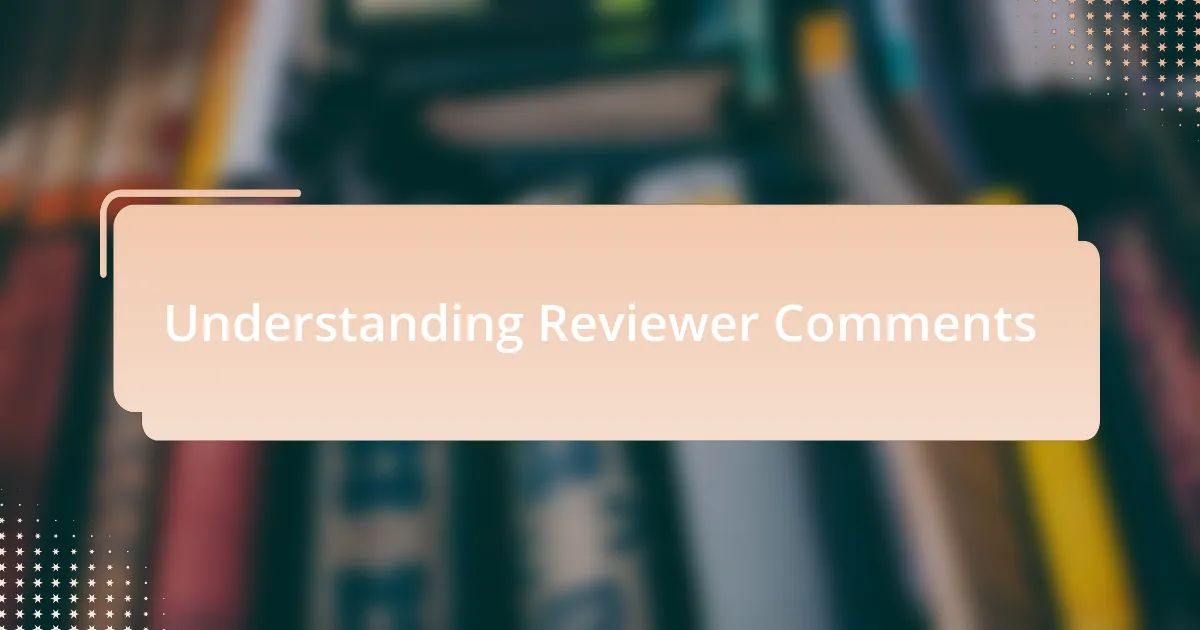
Understanding Reviewer Comments
Reviewer comments can often feel overwhelming, particularly when they challenge the core of our arguments or methodologies. I vividly remember receiving feedback on a manuscript I had poured my heart into—some suggestions left me feeling disheartened. But once I stepped back, I realized that this critique could ultimately enhance my work.
Digging deeper into these comments reveals valuable insights that can refine not only our paper but also our understanding of the topic. Have you ever considered that a reviewer’s tough feedback is often a reflection of their passion for the field? I’ve found that approaching each comment as a learning opportunity transforms the entire revision process into a collaborative experience with peers.
It’s easy to see comments as roadblocks rather than stepping stones. However, I’ve learned to embrace questions like, “What can I learn from this?” Each piece of feedback offers a chance to re-evaluate my ideas and enhance clarity in my writing, ultimately leading to a more robust publication. It’s about shifting our mindset from defensiveness to receptiveness.
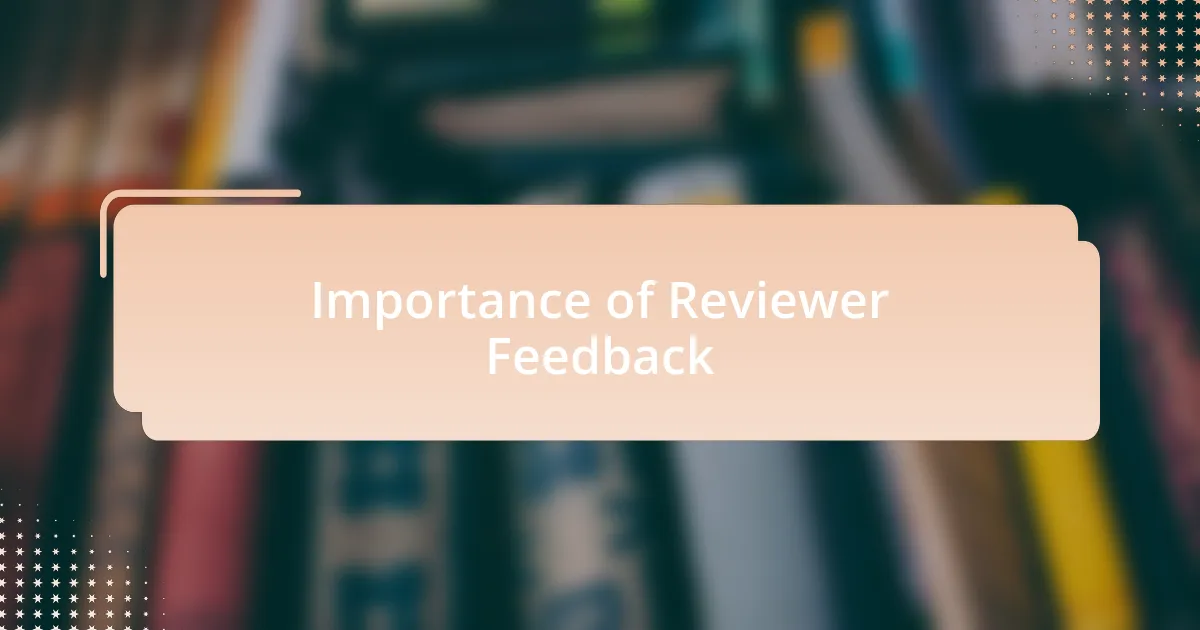
Importance of Reviewer Feedback
Reviewer feedback holds immense importance in the academic publishing journey. I recall a time when a reviewer pointed out inconsistencies in my data analysis. At first, it stung, but their comments prompted me to reassess my methods, leading to a clearer and stronger argument. This experience reinforced my belief that constructive criticism is a gateway to growth.
Sometimes, I wonder how many valuable insights are lost when authors dismiss reviewer comments as mere nitpicking. In my own experience, engaging deeply with this feedback has often revealed blind spots in my research. Instead of seeing the reviewer as an adversary, I learned to view them as a mentor whose keen observations can lead to breakthroughs in my understanding of the subject matter.
Moreover, feedback serves as a reality check—keeping our work grounded and aligned with the scientific community’s standards. I remember receiving a comment that challenged a long-held assumption in my writing. While it was uncomfortable to face, addressing that critique challenged me to refine my argumentation skills. This taught me that the richness of academic dialogue lies in our willingness to be vulnerable to critique.
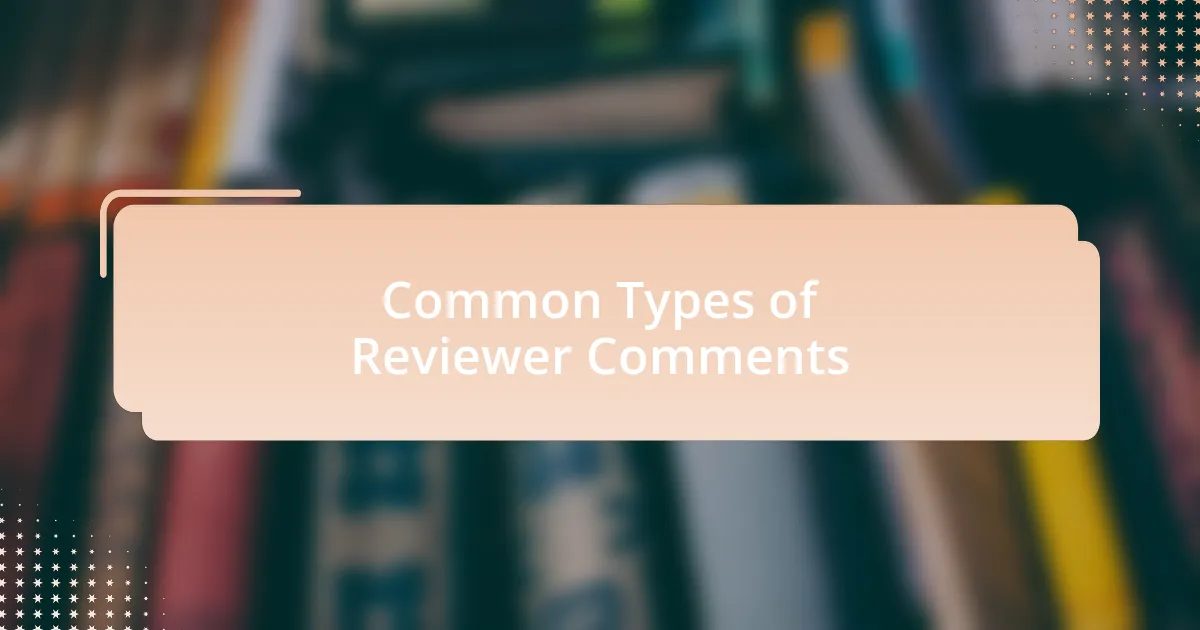
Common Types of Reviewer Comments
Reviewer comments can often fall into various categories, each serving a unique purpose in the refining of our work. For instance, I’ve frequently encountered methodological critiques where reviewers question my experimental design or analytical techniques. These comments have sometimes felt daunting, yet they pushed me to clarify my methodology, ensuring that it stands up to scrutiny and enhances the credibility of my findings.
Another common type of feedback involves literature gaps, where reviewers highlight areas you may have overlooked or pertinent studies that didn’t make it into your references. I vividly remember a time when a reviewer pointed out a key paper that directly related to my topic. Initially, I felt a mix of frustration and embarrassment, but incorporating that work enriched my argument and made my conclusions more robust. Have you ever missed a significant reference that could strengthen your case?
Lastly, clarity and organization comments are a staple in most reviews. These typically address sections of our papers that may be convoluted or unclear to readers. I once received feedback suggesting a significant restructuring of my introduction. At first, I resisted the idea—my introduction felt right to me! However, I later found that reworking it not only improved readability but also clarified my core thesis. It made me appreciate how essential clear communication is in academic writing.
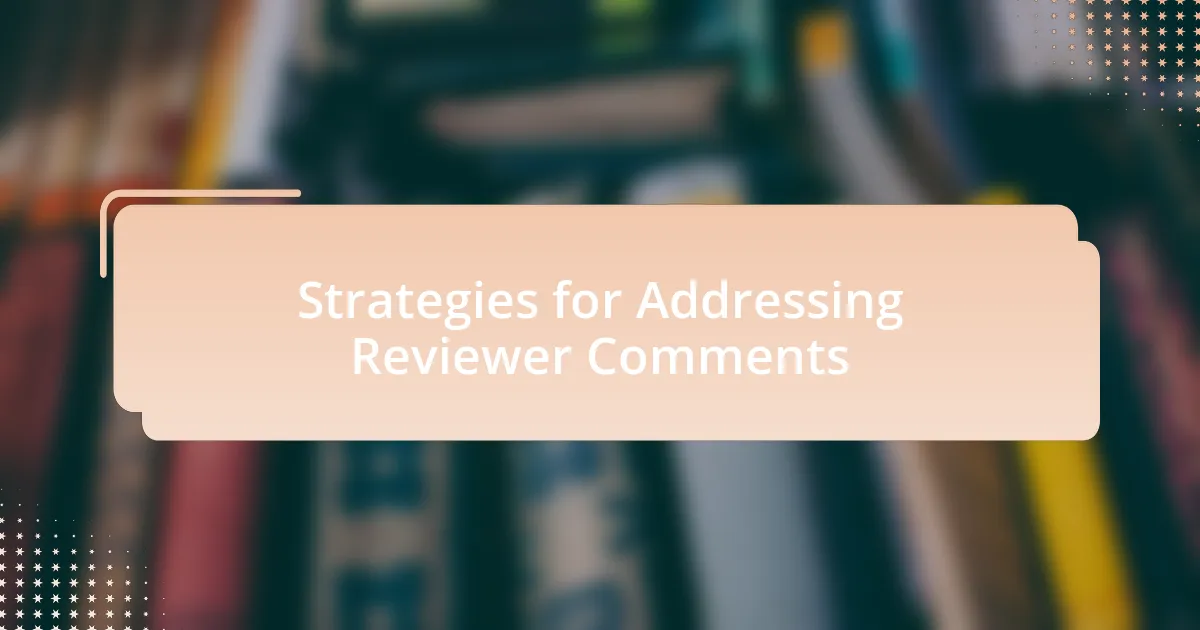
Strategies for Addressing Reviewer Comments
When I first tackled reviewer comments, I discovered that creating a detailed response letter was invaluable. Each comment requires a thoughtful reply that acknowledges the reviewer’s perspective. I remember a particular case where I expressed genuine appreciation for a reviewer’s insights, even though I disagreed with some points. This practice not only sharpened my argument but also fostered a more positive tone in the correspondence. Have you ever considered how a respectful exchange can lead to a deeper understanding?
Another effective strategy is to prioritize feedback based on its impact on your research. I often categorize comments into “major” and “minor” issues. For instance, addressing a fundamental flaw pointed out by a reviewer often takes precedence over stylistic preferences. This approach not only streamlines the revision process but also helps me focus on enhancing the core aspects of my work. What feedback have you found most challenging to prioritize?
Lastly, I find that utilizing peer consultations can significantly elevate my response to reviewer comments. After receiving constructive criticism, discussing the feedback with colleagues can provide fresh perspectives and innovative solutions. I once reached out to a trusted peer who helped me interpret a particularly complex comment on my theoretical framework. Their insight enabled me to address the reviewer’s concerns much more effectively than I could have on my own. Isn’t it fascinating how collaboration can transform our understanding of feedback?
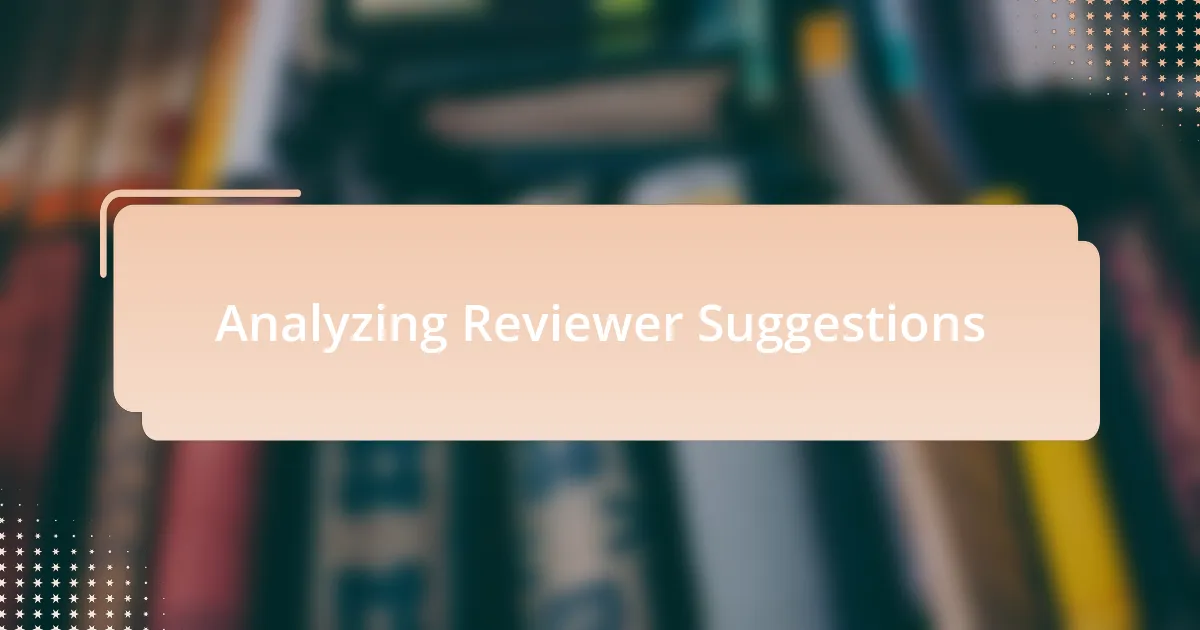
Analyzing Reviewer Suggestions
Analyzing reviewer suggestions requires a balanced approach that combines critical thinking with an open mind. I often find myself revisiting each comment, not just to understand it but to explore its implications on my work. For example, when a reviewer suggested incorporating a different methodology, I was initially hesitant. However, after reflecting on their reasoning, I realized that their suggestion could enhance the robustness of my findings. Isn’t it intriguing how a fresh perspective can challenge our assumptions?
I also recommend taking notes on recurring themes within the feedback. After one submission, I noticed that several reviewers pointed out similar weaknesses in my argumentation. Instead of dismissing their comments as just personal preferences, I decided to invest time in reevaluating that section. This not only helped clarify my position but also improved my overall manuscript significantly. Have you ever felt stuck, only to discover that others see clearly where you don’t?
Finally, I embrace the idea of considering reviewer comments as a learning experience. Each suggestion is an opportunity for growth, both as a researcher and a writer. I once received a set of comments that felt overwhelming, but after dissecting them methodically, I found treasures in the critiques that improved my writing clarity. Engaging deeply with reviewer insights allows us to evolve and refine our ideas. How do you turn criticism into an opportunity for improvement?

Personal Experiences with Reviewer Feedback
Navigating reviewer feedback can sometimes feel like a rollercoaster of emotions. I vividly recall one instance where I received a particularly harsh critique on the statistical analysis in my paper. Initially, I felt disheartened, questioning my competence as a researcher. However, rather than dismissing the reviewer’s concerns, I dove into the data once more. This led me not only to rectify errors but also to uncover insights I hadn’t considered before. Isn’t it fascinating how moments of doubt can spark some of our most profound breakthroughs?
On another occasion, I was thrilled to receive praise for the conceptual framework in my work. Yet, alongside that compliment came a request for more detailed explanations. At first, I viewed it as a contradiction, but I soon recognized that the feedback aimed at making my work even more accessible. This experience taught me to appreciate the duality of feedback—how criticism, even when it stings, often masks a desire for clarity and connection with readers. Have you ever experienced a similar revelation about the nature of reviewer comments?
Lastly, I’ve discovered that embracing feedback fosters a growth mindset in my academic journey. After submitting a manuscript, one reviewer’s suggestion to tighten the introduction resonated deeply with me; it pushed me to rethink how I presented my ideas. Initially, I resisted the change, but ultimately, it transformed the entire narrative. Reflecting on this, I realize that every piece of feedback serves as a stepping stone toward my development as a scholar. How do you approach the reviews that challenge you the most?
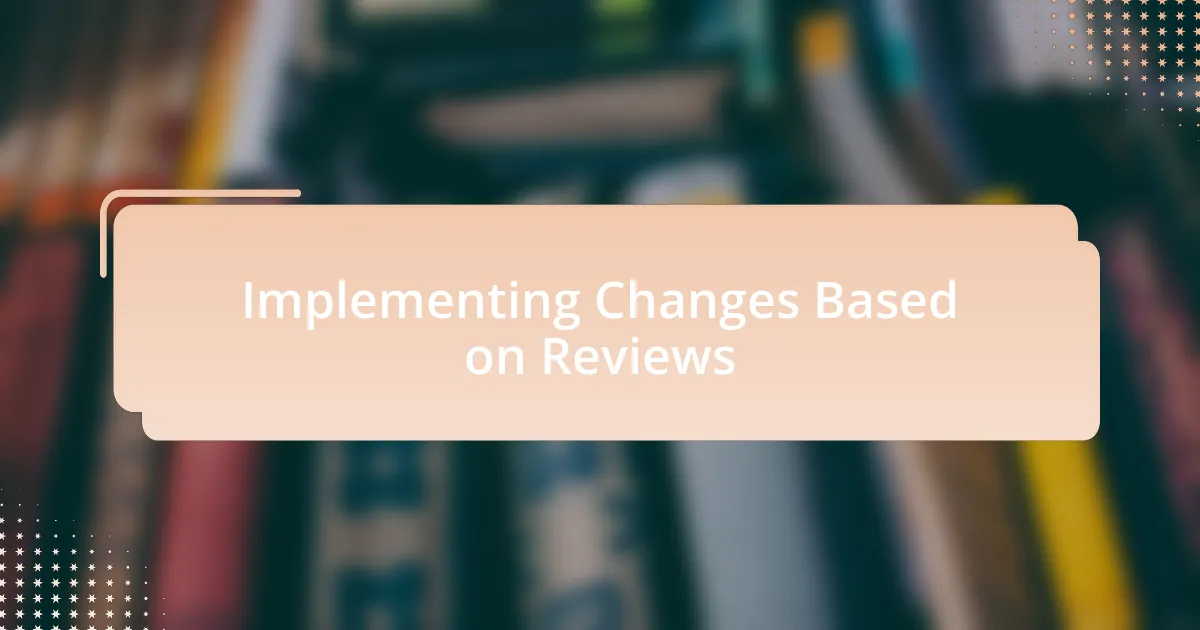
Implementing Changes Based on Reviews
Implementing changes based on reviewer feedback can be a transformative experience. I remember a time when I received dozens of comments regarding the methodology section of my paper. I initially felt overwhelmed by the volume of suggestions but soon realized that each point highlighted a critical aspect I had overlooked. This shift in perspective turned my focus from frustration to gratitude, demonstrating how constructive criticism can enhance my work significantly.
When I began revising, I embraced a collaborative approach. I reached out to colleagues to discuss the revisions suggested by the reviewers. Engaging others not only provided me with fresh insights but also eased my anxiety. Have you ever considered how discussing feedback with peers can lead to deeper understanding? Their perspectives helped me refine my arguments and develop a clearer presentation of my findings, making the implementation of changes feel less daunting.
I also learned to view reviewer comments as an opportunity to engage my readers more effectively. For instance, a suggestion to include more examples in my analysis pushed me to reflect on my target audience’s needs. This prompted me to broaden my explanations significantly, ultimately enriching my manuscript. How often do you think about who will read your work while implementing changes? It’s a reminder that feedback doesn’t just enhance the paper; it strengthens my connection with the scholarly community.